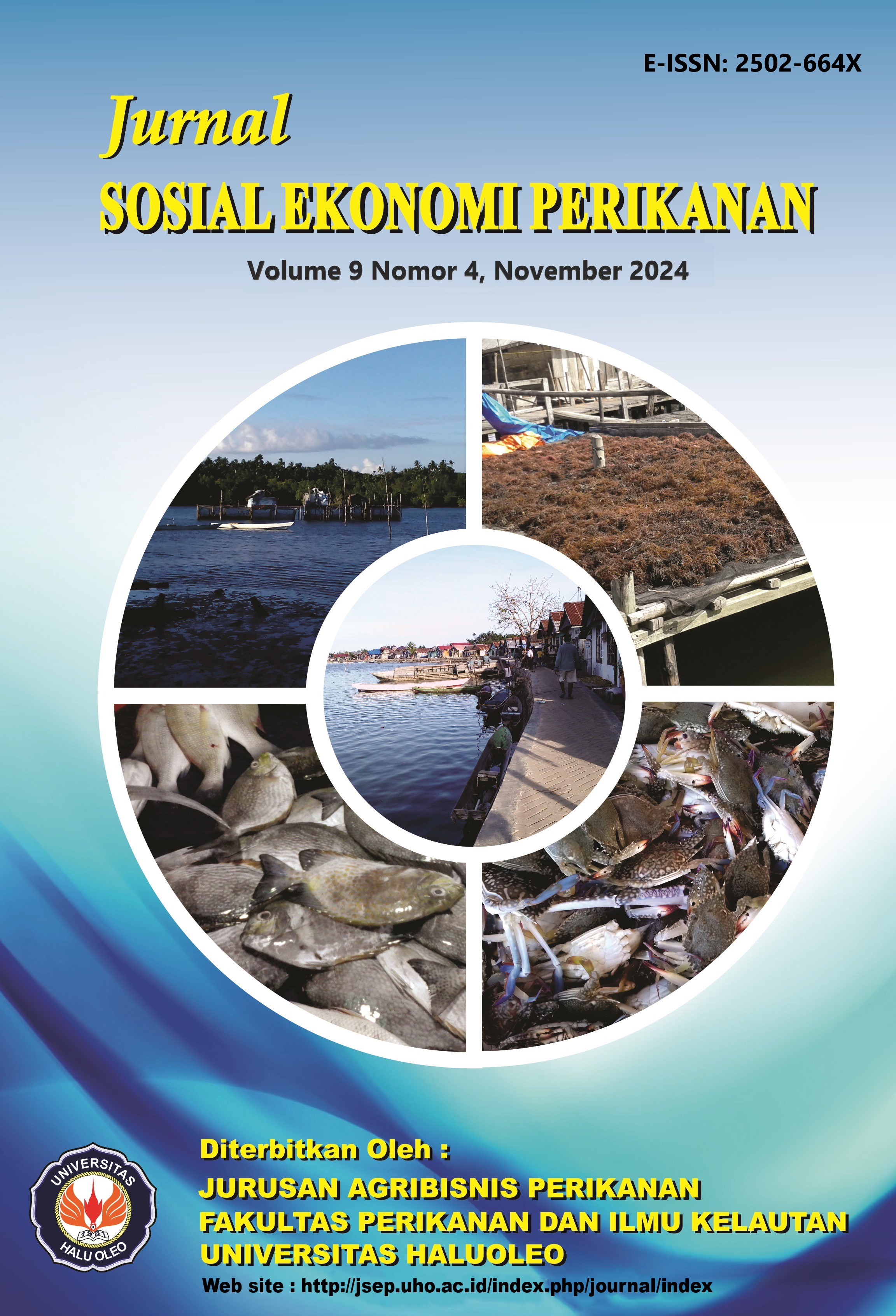Social capital in increasing of fishermen welfare (Case Study of Sikuyuh group in Lapulu Village, Abeli District, Kendari)
DOI:
https://doi.org/10.33772/jsep.v9i4.125Keywords:
Social capital, fishermen groups, Sikuyuh, poverty, welfareAbstract
The purpose of this research is to discover how social capital is organised within a fishing community and analyse how social capital affects the well-being of fishermen in the Sikuyuh fishing community. The research variables include fishermen's household welfare, norms, networks, and trust levels. The influence of several components of social capital was analyzed using multiple regression techniques. Data were collected through interviews, questionnaire, observations, and documentation, while the research sample used census method. Variables were measured using a Likert scale and score-based assessments for each indicator. The study results reveal that the presence of social capital in the Sikuyuh fishing group encompasses norms that are implemented and upheld in the community. Social interactions within the group provide benefits to fishermen, such as collaboration in mutual aid activities, sharing information, and offering mutual support to sustain their livelihoods. High levels of trust among fishermen foster strong relationships and help prevent potential conflicts within the Sikuyuh fishing group. The multiple regression analysis produced the equation: Y = 1.247 + 0.126X₁ + 0.589X₂ + 0.329X₃. This equation shows that fishermen's household welfare (Y) is influenced by three variables: norms (X₁), networks (X₂), and trust (X₃). It reveals that the analyzed components of social capital significantly impact the welfare of fishermen's households. This finding emphasizes that the higher the social capital possessed by members of the Sikuyuh fishing group, the greater its positive impact on their household welfare.
References
BPS Kendari. (2023). Kota Kendari dalam Angka 2023. Badan Pusat Statistik Kendari.
Ghozali, I. (2016). Aplikasi analisis multivariete dengan program IBM SPSS 23.
Heriza, B., & Mulianingsih, F. (2023). Peran Modal Sosial Dalam Kesejahteraan Masyarakat Nelayan Tambak Lorok Semarang Utara. Sosiolium: Jurnal Pembelajaran IPS, 5(1), 41-52.
Kusdiantoro, K., Fahrudin, A., Wisudo, S. H., & Juanda, B. (2019). Perikanan tangkap di Indonesia: potret dan tantangan keberlanjutannya. Jurnal Sosial Ekonomi Kelautan Dan Perikanan, 14(2), 145-162.
Naila, D. F. (2024). Pengaruh Jaringan Sosial Terhadap Tingkat Kesejahteraan Pedagang (Studi Pada Pedagang yang Menyewa Kios/Toko di Pasar Cureh). Jurnal Ilmiah Mahasiswa Fakultas Ilmu Sosial & Ilmu Politik, 9(2).
Narayan, D., & Pritchett, L. (1999). Cents and sociability: Household income and social capital in rural Tanzania. Economic development and cultural change, 47(4), 871-897.
Nazmar, E. (2014). Upaya peningkatan ekonomi rumah tangga nelayan skala kecil dengan memanfaatkan waktu luang di luar penangkapan ikan (off-fishing) di kota Padang. Jurnal Apresiasi Ekonomi, 2(1), 15-25.
Prayitno, U. S. (2019). Ajeg Bali Dan Modal Sosial: Studi Sosiologi Terhadap Perubahan Sosial Masyarakat Bali. Aspirasi: Jurnal Masalah-Masalah Sosial, 7(2), 113-126.
Putnam, R. D. (2000). Bowling alone: The collapse and revival of American community. Simon Schuster.
Safas, P. N., Heriyanti, L., & Wijayanti, A. (2024). Analisis Modal Sosial Terhadap Keberlanjutan Kehidupan Sosial Ekonomi Nelayan di Pondok Besi, Kota Bengkulu. Jurnal Ilmiah Sosiologi Agama (JISA), 7(2), 37-54.
Tou, T., Kerebungu, F., Hasrin, A., & Sasea, S. C. (2023). Modal Sosial dalam Masyarakat Nelayan di Desa Lalubi Kecamatan Gane Timur Kabupaten Halmahera Selatan. Indonesian Journal of Social Science and Education, 3(1), 34-43.
Downloads
Published
How to Cite
Issue
Section
License
Copyright (c) 2024 Fitriah Amir

This work is licensed under a Creative Commons Attribution 4.0 International License.
Jurnal Sosial Ekonomi Perikanan (JSEP) dilisensikan di bawah lisensi (CC Attribution 4.0). Pengguna bebas untuk menggubah, memperbaiki, dan membuat ciptaan turunan bukan untuk kepentingan komersial, dan walau mereka harus mencantumkan kredit kepada Anda dan tidak dapat memperoleh keuntungan komersial, mereka tidak harus melisensikan ciptaan turunan dengan syarat yang sama dengan ciptaan asli.





